Bigger is better for construction
23 December 2024

 Nothing encapsulates a buoyant construction market better than signing a contract to complete the world’s tallest tower. That happened on 2 October 2024, when Saudi Binladin Group (SBG) was awarded a $2bn contract to complete the 1,000-metre-plus Jeddah Tower.
Nothing encapsulates a buoyant construction market better than signing a contract to complete the world’s tallest tower. That happened on 2 October 2024, when Saudi Binladin Group (SBG) was awarded a $2bn contract to complete the 1,000-metre-plus Jeddah Tower.
The award was significant in many ways. It was a revival of the tower project, which has been on hold since 2018, and it was also a comeback for SBG after years of financial stress that had led many in the market to think it would never win another major construction deal.
On a macro level, the construction deal confirmed that the region is home to the world’s most daring and challenging construction projects.
More importantly, these projects are more than just aspirations; they are real projects that are being built.
Biggest contracts
While Jeddah Tower was the most symbolic contract award in 2024, at $2bn, it was not the largest. That accolade went to the Italian contractor WeBuild when it was awarded a $4.7bn contract for the construction of the three dams at the Trojena mountain resort at Neom in January.
Like Jeddah Tower, the project is a challenging one. Time pressure is a key issue. Trojena has been selected to host the 2029 Asian Winter Games, and the reservoir will be used to make the snow for the event. This means the dams must be completed and the reservoir filled well in advance.
The project is also technically complex. The main dam will have a height of 145 metres and will be 475 metres long at its crest. Inside the reservoir there will be a kidney-shaped dam that will house an attraction known as the Enchanted Forest, which will be connected to the rest of the Trojena development by an underwater tunnel.
WeBuild’s involvement also highlighted that international contractors, after sitting on the sidelines for a number of years, are playing an active role in the Saudi construction market.
One market segment that has attracted strong interest is building stadiums, which like Trojena have to be completed for football tournaments with fixed dates: the 2027 Asian Games and the 2034 Fifa World Cup.
In October, Spain’s FCC in joint venture with the local Nesma & Partners secured a $1bn contract to build the Prince Mohammed Bin Salman Stadium at the Qiddiya City development on the outskirts of Riyadh.
Earlier in the year, a joint venture of Belgian contractor Besix and the local Albawani was awarded the contract to build the Aramco football stadium in Al-Khobar, and Beijing-headquartered China Railway Construction Corporation and local contractor Sama Construction for Trading & Contracting won the contract to construct the Jeddah Central stadium project.
Outside of Saudi Arabia, there were only two contract awards valued at over $1bn and both were in the UAE emirate of Abu Dhabi.
In January, a $1.2bn contract to complete phases two and four at the Saadiyat Lagoons project was awarded to a joint venture of two Abu Dhabi-based contractors, Trojan Construction Group and Arabian Construction Company.
The other $1bn-plus deal was a $1.4bn contract to complete dredging and marine works for the Nisi Island development, which was awarded to the local NMDC Group.
These deals were highlights in what was a strong year for the rest of the market. In total, according to regional projects tracker MEED Projects, there were $67.9bn of construction contract awards by the end of October 2024. If the trajectory is maintained until the end of the year, it will result in about $81.4bn of awards, which is lower than the $96.9bn of awards recorded in 2023, but still higher than any of the eight years from 2015 to 2022.
 Market challenges
Market challenges
Replicating the record-breaking performance of 2023 was never going to be easy, especially after Riyadh warned that its spending would be more targeted at the end of 2023. Those comments, made by the finance minister, set the tone for 2024, which proved to be a year with plenty of contract awards, but without the apparent carefree attitude to spending that characterised 2023.
The other challenge with following on from a bumper year is supply chain constraints. With full order books, contractors and suppliers have lost some of the appetite that they had for new work in 2023. The result of this for project clients has been difficulties in attracting enough bidders, and when bids are submitted, the offers are often not competitively priced.
These challenges have been felt most acutely by projects in the remote regions of Saudi Arabia. The issue is so prevalent at Neom that there is now a phenomenon known as ‘Neom inflation’, which implies that the $500bn gigaproject in the remote northwestern corner of the kingdom has its own unique inflation rate.
These regional issues have added to the international supply chain constraints that have been felt since the Covid-19 pandemic and, more recently, during the conflict in Gaza and threats to shipping lanes in the Red Sea.
 Addressing challenges
Addressing challenges
The market has responded to these challenges. In Saudi Arabia, the Public Investment Fund (PIF) invested in four of the kingdom’s largest general contractors in 2023. Then, in February 2024, the sovereign wealth vehicle announced that it had, together with the National Infrastructure Fund, introduced a new contractor financing programme, designed to strengthen the construction sector’s finances.
The programme aims to provide contractors with finance solutions to help improve their cash flows.
Developers have also been improving their contract terms and, crucially, working to ensure payments are processed on time – a move that should also help improve contractor cash flows.
The PIF-backed development companies have also been actively working on attracting new companies to Saudi Arabia. They have been travelling the world on roadshows to attract more contractors and suppliers to projects in the kingdom.
These roadshows have been highlighting the volume and scale of the opportunities in Saudi Arabia, and have shown that the kingdom offers long-term opportunities for companies that come and invest in the market.
In the UAE, Abu Dhabi has invested heavily in its construction supply chain. With its government-controlled investment vehicles and a series of interconnected mergers and acquisitions, Abu Dhabi and its ruling family now own the emirate’s key contracting companies and the suppliers of vital raw materials such as cement and steel.
These national champions shield Abu Dhabi from many, but not all, supply chain challenges that have impacted projects in other markets.
Meanwhile, in Dubai, where the real estate market is driving construction, private sector developers are courting contractors to work on their projects.
As private entities, they are not bound by the procurement regulations that government or government-controlled developers have, so they have been offering directly negotiated deals to help guarantee that their projects are delivered on time.

2025 outlook
Unless the market dynamics shift dramatically, the market will likely face many of the same challenges in 2025.
One of the overriding fears is a sharp slowdown in project spending in Saudi Arabia. This has happened before and is a valid concern, and the market has already shown signs of plateauing in some areas.
This is most noticeable when contract awards for the five official gigaprojects – Diriyah, Neom, Qiddiya, Red Sea Global and Roshn – are examined. After a sharp ramp-up in awards from 2020 to 2023, the pace of contract awards levelled off in 2024, which reflects budgetary concerns within the development companies and the PIF, and the market’s ability to take on such large volumes of new work.
With budgets under pressure, developers in Saudi Arabia are increasingly looking for investment to help fund their projects. The success of these efforts will determine how buoyant the market in the kingdom remains over the long term.
Even if investment comes in, it will take time, which means there will likely be a degree of conservatism from development companies in 2025. This was signalled in mid-November, when Neom, while announcing the exit of CEO Nadhmi Al-Nasr and the appointment of Aiman Al-Mudaifer as acting CEO, said: “As Neom enters a new phase of delivery, this new leadership will ensure operational continuity, agility and efficiency to match the overall vision and objectives of the project.”
While there may be a pause in spending on some of the Saudi gigaprojects, other schemes continue to underpin the performance of the construction market.
Oil prices remain supportive of government spending on projects across the Gulf, and for the private sector, in markets such as the UAE, real estate projects continue to move into construction as developers rush to deliver units to investors and capitalise on the ongoing strength of the property market.
Exclusive from Meed
-
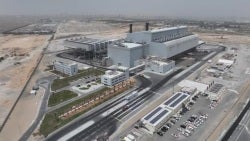 Dubai tenders Warsan waste-to-energy consultancy contract
Dubai tenders Warsan waste-to-energy consultancy contract16 February 2026
-
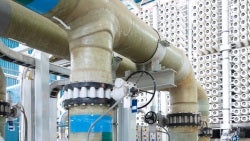 Saudi Arabia wastewater plant reaches financial close
Saudi Arabia wastewater plant reaches financial close16 February 2026
-
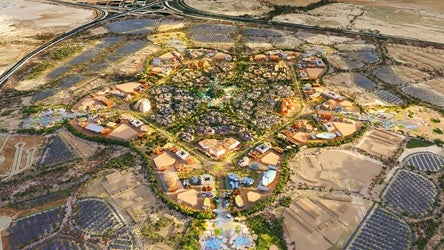 Riyadh tenders Expo 2030 site offices contract
Riyadh tenders Expo 2030 site offices contract16 February 2026
-
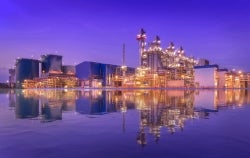 Acwa refinances $2.45bn Hassyan IPP debt
Acwa refinances $2.45bn Hassyan IPP debt16 February 2026
-
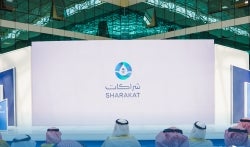 SWPC rebrands as Sharakat to reinforce PPP focus
SWPC rebrands as Sharakat to reinforce PPP focus13 February 2026
All of this is only 1% of what MEED.com has to offer
Subscribe now and unlock all the 153,671 articles on MEED.com
- All the latest news, data, and market intelligence across MENA at your fingerprints
- First-hand updates and inside information on projects, clients and competitors that matter to you
- 20 years' archive of information, data, and news for you to access at your convenience
- Strategize to succeed and minimise risks with timely analysis of current and future market trends

Related Articles
-
 Dubai tenders Warsan waste-to-energy consultancy contract
Dubai tenders Warsan waste-to-energy consultancy contract16 February 2026
Dubai Municipality has issued a tender for consultancy services on the second phase of the Warsan waste-to-energy (WTE) plant.
The tender covers feasibility, procurement and construction supervision services for the project.
The bid submission deadline is 25 February.
The project relates to the planned expansion of the Warsan WTE plant in Dubai. The scheme has an estimated budget of $500m.
The facility will be located in Warsan 2, next to the Al-Aweer sewage treatment plant. As MEED understands, it will use treated wastewater from that facility.
The project scope includes construction of treatment lines, a boiler hall, waste bunkers, a flue gas treatment system, a main electrical station and associated infrastructure.
The contract duration is six years
Expansion strategy
The original Warsan WTE plant, Dubai’s first major WTE public-private partnership (PPP) project, reached full commercial operations in 2024.
Located in the Warsan area, the AED4bn ($1.1bn) facility treats 1.9 million tonnes of municipal solid waste annually, generating up to 220MW of thermal energy that is fed into the local grid.
In February 2023, state utility Dubai Electricity & Water Authority (Dewa) and Dubai Waste Management Company signed the power-purchase agreement (PPA) for the project.
Dubai Waste Management Company, the special-purpose vehicle implementing the scheme, reached financial close in June 2021 for the project.
The main contractor was a consortium of Belgium’s Besix Group and Hitachi Zosen Inova of Switzerland.
The expansion aligns with Dubai’s long-term waste strategy. In February 2022, the emirate approved a AED74.5bn budget covering waste management initiatives from 2021 to 2041.
The strategy promotes innovation in waste management, recycling and energy conservation. It anticipates private sector contributions of AED70.5bn, equivalent to about 95% of the total planned investment.
https://image.digitalinsightresearch.in/uploads/NewsArticle/15660272/main.jpg -
 Saudi Arabia wastewater plant reaches financial close
Saudi Arabia wastewater plant reaches financial close16 February 2026

The planned $500m industrial wastewater treatment plant (IWWTP) in Jubail in Saudi Arabia’s Eastern Province has reached financial close, sources have confirmed to MEED.
Located in Jubail Second Industrial City, the facility will treat and recycle wastewater from Satorp’s under-construction Amiral chemical derivatives complex, also in Jubail.
The project reached financial close after hedging arrangements were completed on 12 February, sources said.
A consortium of Saudi utilities provider Marafiq, the regional business of France’s Veolia and Bahrain/Saudi Arabia-based Lamar Holding is developing the project under a 30-year concession agreement.
Saudi Aramco Total Refining & Petrochemical Company (Satorp), a joint venture of Saudi Aramco and France’s TotalEnergies, awarded the contract last September.
As MEED exclusively reported, Egypt’s Orascom Construction is the engineering, procurement and construction (EPC) contractor for the project, which is expected to be commissioned in 2028.
Marafiq, formally Power & Water Utility Company for Jubail and Yanbu, will own a 40% stake in the dedicated project company. Veolia Middle East will hold a 35% stake, and Lamar Holding’s Lamar Arabia for Energy will hold the other 25%.
The planned IWWTP, which will primarily serve the $11bn sprawling Amiral chemicals zone, will implement advanced water treatment and recovery technologies to process complex industrial effluents, including spent caustic streams. Treated water will be reintegrated into the industrial processes, supporting closed-loop reuse and energy efficiency.
As of February, more than 50% of construction on Satorp’s Amiral facility has been completed. Commissioning is targeted for the end of 2027.
Construction is also ongoing on a separate industrial wastewater treatment plant (IWTP8) in Jubail. Saudi Services for Electro Mechanic Works is the contractor for the development’s fourth expansion phase.
The Marafiq-owned project is scheduled to be completed by the end of the quarter.
https://image.digitalinsightresearch.in/uploads/NewsArticle/15660112/main.jpg -
 Riyadh tenders Expo 2030 site offices contract
Riyadh tenders Expo 2030 site offices contract16 February 2026

Saudi Arabia’s Expo 2030 Riyadh Company (ERC), tasked with delivering the Expo 2030 Riyadh venue, has tendered a contract that includes the construction of site offices required for the initial construction works.
MEED understands that the package was retendered in early February, with a bid submission deadline of 26 February.
The contract was first tendered in May last year, with bids submitted in July, as MEED reported.
The tendering activity follows the Royal Commission for Riyadh City (RCRC) issuing a design-and-build tender for the construction of a new metro station serving the Expo 2030 site.
The new metro station will be located on Line 4 (Yellow Line) of the Riyadh Metro network.
MEED understands that the tender was floated in early February, with a bid submission deadline of 3 May.
Construction work on the Expo 2030 Riyadh site is progressing at an accelerated pace. In January, ERC awarded an estimated SR1bn ($267m) contract to deliver the initial infrastructure works at the site.
The contract was awarded to the local firm Nesma & Partners.
The scope of work covers about 50 kilometres (km) of integrated infrastructure networks, including internal roads and essential utilities such as water, sewage, electrical and communication systems, and electric vehicle charging stations.
Contractors are also bidding for infrastructure lots two and three. In December, MEED reported that ERC had floated another tender for the project’s initial infrastructure works.
The masterplan encompasses an area of 6 square kilometres, making it one of the largest sites designated for a World Expo event. Situated to the north of the Saudi capital, the site will be located near the future King Salman International airport, providing direct access to various landmarks within Riyadh.
Countries participating in Expo 2030 Riyadh will have the option to construct permanent pavilions. This initiative is expected to create opportunities for business and investment growth in the region.
The expo is forecast to attract more than 40 million visitors.
In a statement, the Public Investment Fund said: “During its construction phases, Expo 2030 Riyadh and its legacy are projected to contribute around $64bn to Saudi GDP and generate approximately 171,000 direct and indirect jobs. Once operational, it is expected to contribute approximately $5.6bn to GDP.”
https://image.digitalinsightresearch.in/uploads/NewsArticle/15659580/main.jpg -
 Acwa refinances $2.45bn Hassyan IPP debt
Acwa refinances $2.45bn Hassyan IPP debt16 February 2026
Register for MEED’s 14-day trial access
Saudi Arabia’s Acwa has announced it has refinanced the existing debt facilities of the Hassyan independent power project (IPP) in Dubai.
In a post on social media platform LinkedIn, the developer said the transaction is the largest refinancing it has completed, valued at $2.45bn.
It added that the deal is backed by a new group of lenders. These lenders have yet to be disclosed.
The Hassyan IPP has a generation capacity of 2,400MW and reached full commercial operations in 2023.
The project was originally developed as a coal-fired IPP. It was later converted to operate on natural gas instead, reflecting changes in Dubai’s power generation strategy.
A consortium comprising Acwa – formerly Acwa Power – and China’s Harbin Electric won the contract to develop the project in 2016.
Acwa and Harbin Electric hold 26.95% and 14.7% stakes, respectively, in the project company Hassyan Energy Company. Dubai Electricity & Water Authority (Dewa) holds 51%, while Silk Road Fund owns 7.35%.
The Hassyan plant forms part of Dewa’s wider generation portfolio. Other major assets include the Jebel Ali and Al-Aweer power complexes, Mohammed Bin Rashid Al-Maktoum (MBR) Solar Park and the Hatta hydroelectric project.
MBR Solar Park is the largest single-site solar park in the world, with a planned capacity target of 7,260MW by 2030.
Dewa recently extended the bid deadline for its seventh phase, which will add 2,000MW from photovoltaic solar panels and includes a 1,400MW battery energy storage system with a six-hour capacity.
The new bid submission deadline is 1 May.
https://image.digitalinsightresearch.in/uploads/NewsArticle/15659537/main.jpg -
 SWPC rebrands as Sharakat to reinforce PPP focus
SWPC rebrands as Sharakat to reinforce PPP focus13 February 2026
Register for MEED’s 14-day trial access
Saudi Water Partnership Company (SWPC) has unveiled a new corporate identity as part of a strategy to reinforce the role of public-private partnerships (PPPs).
At a ceremony in Riyadh, the company said it will operate under the name Sharakat, reflecting its “evolution and expanding mandate in the kingdom’s water sector”.
The new identity comes as Saudi Arabia expands the use of PPPs to deliver infrastructure projects.
In January, the government launched a National Privatisation Strategy targeting more than 220 PPP contracts by 2030, including projects in the water sector.
The government is targeting over $64bn (SR240bn) in private capital investments in this period, which it said would be “a new phase focused on execution and accelerating delivery”.
Previously, the 2018 privatisation programme had focused on the ‘foundational phase’.
SWPC has served as the principal offtaker of all water in Saudi Arabia since 2017. Its mandate covers desalinated water, transmission and treatment projects. It also includes small-scale plants, collection networks and strategic water reservoirs.
The total investment value of its current projects exceeds SR56bn ($14.9bn), the offtaker said.
According to MEED Projects, SWPC has over $11bn-worth of PPP projects in the pipeline, with two projects ($2.10bn) currently under bid evaluation.
In December, local firm Vision Invest was named as the preferred bidder to develop and operate the 859-kilometre Riyadh-Qassim independent water transmission pipeline project.
The consortium of Miahona (Saudi Arabia), Marafiq Company and Buhur for Investment was also named as the preferred bidder for the Arana independent sewage treatment plant (ISTP).
Financial close for both projects is expected in 2026.
Meanwhile, SWPC has issued a request for proposals for the $150m Riyadh East ISTP, which will have a treatment capacity of 200,000 cubic metres a day (cm/d), expandable to 400,000 cm/day in the second phase.
The bid submission deadline is 2 April.
https://image.digitalinsightresearch.in/uploads/NewsArticle/15647732/main.jpg



